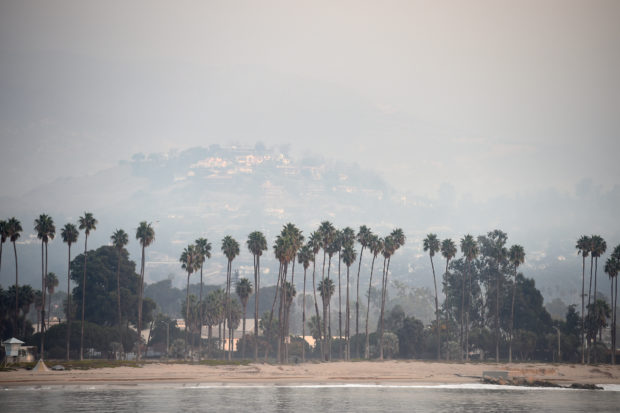
The hills above Santa Barbara are shrouded in smoke from the Thomas Fire, December 12, 2017 in Santa Barbara, California.
The Thomas Fire, now the fifth largest in the state’s history, is effecting business in the popular tourist town of Santa Barbara with stores closing due to poor air quality and less shoppers visiting the stores that are staying open. / AFP PHOTO / Robyn Beck
Crews battling wildfires ravaging southern California for a week have managed to slow the spread of the worst of the blazes, officials said Tuesday, as residents were taking stock of the catastrophic damage.
But the biggest “Thomas” fire, which has charred nearly 95,000 hectares (234,000 acres) of land, remains only 20 percent contained, according to official data, as firefighters warned of an ongoing threat.
Evacuation orders were in place for threatened areas in the Santa Barbara region about 160 kilometers (100 miles) northwest of Los Angeles.
In the past day or so, the blaze figure has grown by around a thousand hectares.
Nearly 6,400 firefighters have been toiling for a week against blazes fueled by bone dry conditions and powerful winds.
Winds will blow at up to 65 km per hour (40 miles per hour), forecasters said, as public health authorities urged people to wear face masks to protect against ash and smoke.
‘End of an era’
Retired pilot Don Thompson, who has an avocado farm in the coastal resort of Carpinteria, near Santa Barbara, described the loss of his recently deceased brother’s house to the blaze as “the end of an era for our family.”
“He built this house himself,” he said pointing to two smoldering stone chimneys that were all that remained.
“Here was the jacuzzi, there — there was a deck where you could see the ocean,” he added.
Half of Thompson’s family’s avocado orchard was destroyed, while thick black smoke persisted Tuesday, limiting visibility to some 50 meters (55 yards).
“There was some tears,” he continued. Though he was more fortunate to save his own property, thanks partly through his family’s own efforts with a water pump, generator, and hose, he admitted he had been overawed by the “majesty” of the inferno. “It’s destruction but it’s still nature and it had some beauty,” he said.
The highway that runs through the area was not enough to stop the spread of the flames, which was propelled by burning vegetation.
On the seaside, the palm trees that symbolize the state for many, were reduced to sad blackened trunks.
‘Increasingly frequent event’
“Thomas” is the fifth biggest fire in California’s history, said Eric Boldt, a meteorologist with the National Weather Service in Los Angeles.
It is the biggest of six blazes that have been burning since last Monday, with the others now more than 90 percent contained.
Altogether, the fires have burned more than 100,000 hectares of land and forced the evacuation of hundreds of thousands of people.
California’s Governor Jerry Brown, meanwhile, warned the wildfires ravaging his state should serve as a warning for other parts of the world threatened by climate change.
“The important fact is that these fires are going to become a very frequent occurrence, that’s what the science is telling us,” he told AFP on the sidelines of the One Planet Summit, held in Paris.
“It’s a real indicator of bad things to come and hopefully will serve to wake up people who right now are too complacent,” he added.
Experts say that global warming increases the risk of out-of-control blazes by drying out vegetation, making it more inflammable and easily set alight by lightning, spontaneous combustion, or fires lit by humans.
Despite the intensity of the fires, which in many areas have left behind scenes reminiscent of a moonscape, authorities so far have reported one fatality — a 70-year-old woman who died in a car accident while fleeing from the flames in the Thomas area.
But authorities are taking nothing for granted.
The fire was still raging in the hills of Carpinteria Tuesday, as firefighters attempted to create a line to stop its progress, Don Camp, a firefighter captain said.
“It could be an active night again, all the communities on the coastline including Santa Barbara are threatened,” added Camp.
Entreaties to leave were not enough for some. Placing his gas mask over his face, Ken Coffey, said he would remain at his house on Shepard Mesa Lane. “I may fry but if I have to go, what more honorable way than defending your family’s house?”